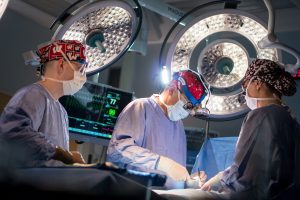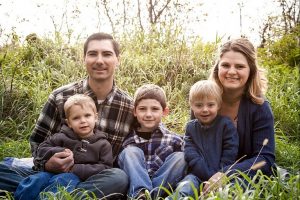Recovering from heart surgery is serious work, especially for our youngest patients. What if there was a way to make that process easier–with watermelon?
The UW pediatric cardiac surgery team is currently participating in a clinical trial that utilizes l-citrulline, a naturally occurring amino acid found in everyday fruits and vegetables like watermelon, cucumber, and garlic, to learn whether administering citrulline during and after operations can prevent or lessen recovery complications.
How citrulline affects the lungs
During heart surgery, patients are put on a cardiopulmonary bypass, which pumps blood and oxygen to the rest of the body while surgeons work on the heart. Some patients may develop lung injury from the bypass, which is treated when symptoms appear.
Previous research found that the body’s naturally occurring citrulline levels fall during cardiac surgery and cardiopulmonary bypass. The body converts citrulline to nitric oxide, which controls blood pressure in the lungs.
Earlier studies found preliminary evidence that supplementation during and after surgery may correct these low levels, and reduce complications of using the bypass. This may also be cheaper than the current treatment, which is to use nitric oxide in a gas form.
Bringing the trial to Madison

University of Wisconsin pediatric heart surgeons Dr. Petros Anagnostopoulos and Dr. Josh Hermsen specialize in treating babies with congenital heart defects. Because of their expertise in pediatric heart surgery, we were invited to participate in the double-blind clinical trial. We were one of the highest enrolling sites across the United States, and the only in Wisconsin.
“As an academic research hospital, participating in trials like these is an important way we work to improve surgery and outcomes for all patients,” said clinical trials Program Manager Kaelin Grant. “It also provides an opportunity for patients to be partners with us in the research we do about their condition.”
UW’s participation is led by Dr. Petros Anagnostopoulos, who is the site Principal Investigator, and a collaborative team of surgeons, cardiologists, intensive care doctors, advanced practice providers and NICU nurses.
Made possible by remarkable families
Studies like this wouldn’t be possible without our remarkable patients and their families who are willing to participate, like the Mehringer family and their son Nolan.

Nolan, who is currently four years old, was born with a congenital heart defect. He had both atrial septal defect (ASD) and a ventricular septal defect (VSD). As he grew, the VSD closed on its own, but doctors advised he needed surgery to address the ASD. The family met with the pediatric heart surgery team at the American Family Children’s Hospital, and in one discussion, was told about the option to participate in the citrulline trial.
“Why wouldn’t we do it?” said Nolan’s mom, Rebecca Mehringer. “It seemed like a very low risk trial, and we felt very fortunate that kids had come before us to make heart surgery possible. If it wasn’t for them, our son couldn’t have the open heart surgery. It’s paying it forward.”
After discussions with the clinical trials team and the care team, the Mehringers signed up as participants.
“Our experience was phenomenal. Every doctor, staff, and nurse respected us, valued us, and was completely 100% there for Nolan. When the research team would come in to check the machine that was giving him the medicine, they were very respectful. It was very low key for us.”
What’s next for the trial
The clinical trial recently closed to new patients, and now is moving to the data analysis and publication phase. After that is done, investigators will find out whether the citrulline treatment worked to help children recuperate better after their heart surgery.
And for Nolan? He had a great recovery, and is back to all his favorite activities, including building LEGO creations with his brothers, playing in the sandbox, taking horse riding lessons, and running around having fun on the family’s farm.